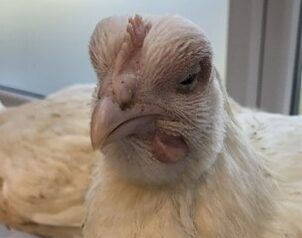By Alex McDaniel, veterinary advisor, Boehringer Ingelheim
This article first appeared in the Poultry Health supplement to August’s issue of Poultry Business magazine
Turkey rhinotracheitis (TRT), avian rhinotracheitis (ART), avian pneumovirus of turkeys (APV) and swollen head syndrome (SHS) are all names for clinical diseases that can be caused by infection with avian metapneumovirus virus (aMPV).
This short article aims to give you a quick refresher on avian metapneumovirus (aMPV), a virus which, although often overshadowed in the industry headlines by diseases such as avian influenza (AI) and infectious bronchitis (IB), has been found to be very much alive and kicking in the UK and globally.
Avian Metapneumovirus (aMPV) is of economic and health significance to the poultry industry globally and since its discovery in turkeys in South Africa in the 1970s it has been isolated around the world in turkeys and a number of other avian species including chickens, ducks, gamebirds and other wild birds.
AMPV predominantly targets the respiratory and reproductive systems in poultry and there are four established subtypes of the virus (A-D) with the recent further discovery of two new subtypes. With the exception of North America, subtype-B is the most widespread.
In the UK, the use of live vaccines such as Nemovac and inactivated (killed) vaccines such as Gallimune 407 and Tur-3, have played a key role in keeping at bay clinical outbreaks of this virus, and are an established component of the majority of breeder and or pullet rearing vaccination programs.
Clinical signs
In meat producing turkeys, upper respiratory tract signs are most common and these include snicking, discharge from the eyes and nostrils, head shaking, swollen sinuses and heads, as well as coughing. In breeding turkeys this can extend to a mild or more significant drop in egg production and egg shell quality and pigment, along with an increase in egg peritonitis due to secondary bacterial infection. In chickens you may not always see obvious clinical signs when infected with aMPV alone.
Swollen head syndrome (SHS) can be associated with infection in broilers, especially if there is concurrent infection with another pathogen such as E. coli. In adult layers a drop in egg production may be seen along with a reduction in egg quality, the virus can also manifest with nervous signs such as star gazing or twisted necks due to inner ear infection. A concurrent infection with other pathogens such as IB, Ornithobacterium rhinotracheale (ORT) or a secondary opportunistic bacteria such as E.coli can result in a more severe clinical presentation and a higher percentage mortality.
Diagnosis
AMPV can be difficult to definitively diagnose and the clinical signs described are in no way exclusive to this virus! It is extremely important to take samples to look for aMPV virus as early as possible after signs of infection are seen as aMPV is known to only persist for up to a week. Isolation of the virus can be even more tricky when there are other pathogens involved such as E.coli .
Samples taken from nasal or ocular secretions, choanal swabs or scrapings from the trachea or sinuses have been shown to have the highest viral load. Where serology is being used to look for rising titres to aMPV via an ELISA, blood sampling is advised at least 2-4 weeks post suspected infection. Diagnosis is often based on the clinical picture and one or more of these tests.
AMPV is a virus, so there is no direct treatment for the disease. Where there is increased mortality due to secondary bacterial infection, antimicrobial treatment may be prescribed by the veterinarian.
Control
As with any disease control plan, the approach is multifactorial. aMPV is known to be circulating in the wild bird population including in gamebirds and can also be spread from infected nearby flocks, so comprehensive biosecurity is key. Concurrent infection with other pathogens such as ORT and IB is known to exacerbate the clinical signs associated with an aMPV outbreak.
Stress is a known immunosuppressant. Poor chick or poult starts, inadequate house temperature and ventilation management and multi-ages sites are significant risk factors for clinical disease. Good water hygiene is also essential to reduce any secondary bacterial involvement.
In the UK, there are live and inactivated aMPV vaccines available on the market and vaccination has played a key part in controlling overt disease in flocks. Live vaccines, usually given in the drinking water or aerosol spray, are used in both meat producing and breeding and laying birds and have been shown to trigger both local and systemic immunity, they form the ‘first line response’ of a birds immunity against aMPV. For longer lived birds, an inactivated (killed) vaccine may also be given after live vaccine ‘priming’, the aim being for the inactivated vaccine to ‘boost’ the bird’s immunity.
A comprehensive wider vaccination program, specific to species and production system, to control other primary pathogens is essential, along with the correct vaccine handling and vaccination technique to ensure the vaccine is delivered successfully to the birds.


